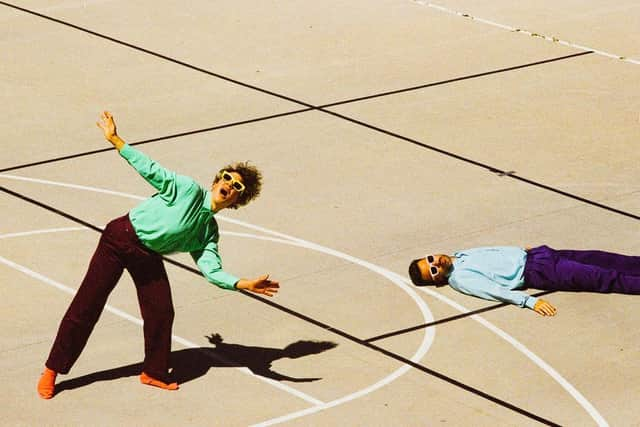Album reviews: The Fratellis | The Snuts | Tune-Yards | Dry Cleaning


The Fratellis: Half Drunk Under A Full Moon (Cooking Vinyl) ****
The Snuts: W.L. (Parlophone) ***
Tune-Yards: sketchy. (4AD) ****


Dry Cleaning: New Long Leg (4AD) ****
Some bands get it right first time, capture the zeitgeist, ride the wave and are potentially set up for life. The Fratellis are one such outfit, though the Glasgow trio were somewhat startled by success in the mid-2000s and ambivalent about life in the pop spotlight. Yet without the indie knees-up bangers on which their debut album, Costello Music, was built, they might not have had the latitude to mature as they have, taking their audience with them.
Advertisement
Hide AdAdvertisement
Hide AdFrontman and songwriter Jon Fratelli has long moved on from the lairy jabber of their early anthems to settle somewhere around the songwriting middle of the road where meticulous arrangements and lush production reside. It’s no accident that Neil Diamond is mentioned in dispatches around their pandemic-delayed sixth album, particularly the twinkling maximalism of the title track, hewn from harpsichord, brass, strings, more cultural references than a Lana Del Rey number and a gleefully bombastic breakdown with an exultant, air-punching cry of “if you hear the music, say yes.”
The rest of the album is not quite as extroverted but it is fastidiously crafted, whether the symphonic country rock of Lay Your Body Down, the classic harmonic production of The Last Songbird, the finely balanced languid lullaby Hello Stranger or the chiming Beach Boys chamber pop of Strangers in the Street, seasoned with a dash of 70s pomp, while the steady stomp of Six Days In June is a rude awakening from the retro reverie and a concession for those about to mosh.


Fratellis producer Tony Hoffer also provides the commercial sheen on the debut album from likely lads The Snuts, who are already positioned as a Fratellis for their generation.
The Whitburn foursome formed at school, and radiate the typical band of lads appeal, albeit with a thoughtful streak – as a group, they have raised funds to compensate their currently unemployed crew and frontman Jack Cochrane has doggedly agitated for a route map back to live music by penning a daily letter to Nicola Sturgeon.
According to the band, their debut album W.L. (presumably denoting their native West Lothian) is “a record about being true, loving and resilient.” Musically, they are clearly standing on the shoulders of indie giants, from Arctic Monkeys to The View, though it is their fellow Whitburn native Lewis Capaldi whose whiny, emoting influences opening acoustic ballad Top Deck.
From this inauspicious start, they build a rosier picture with the warm fuzzy summer pop of Always, the burnished funk blues of Juan Belmonte, punctuated with handclaps and paradiddles, and the light feelgood fare of Somebody Loves You before cranking up the party with the jangling momentum of Glasgow, the two-minute scramble of Don’t Forget It (Punk) and the hectic beat music of Coffee & Cigarettes.
Californian musician Merrill Garbus, trading as Tune-Yards, has sculpted a suitably rhythmic soul record out of drum and bass lockdown jamming sessions with her wingman Nate Brenner. Following the grand tradition of music to make you think and move, Garbus takes society, the Man and herself to task on loose-limbed soul funk songs on subjects such as the human right to a home and what we pass down to our kids, before ending on the hopeful high of be not afraid, a layered avant-gospel call to “don’t regret a thing, just sing”.
Advertisement
Hide AdAdvertisement
Hide AdIntriguing South London quartet Dry Cleaning arrive fully formed on their debut album. New Long Leg blends lean, rhythmic post-punk funk and spoken word stream-of-consciousness lyrics rendered with dispassionate cool by visual artist Florence Shaw, whose witty, pithy free association, inspired by a “joyful revelling in household things,” is dense in imagery, languid in delivery.
CLASSICAL
The Sixteen: Good Night, Beloved (CORO) ****
We could all do with a little peace and hope. So says Harry Christophers about this latest album by his crack choral outfit The Sixteen, which throws in some lovely part songs, both idyllic and flamboyant, alongside the more typical religious fare that is their core repertoire. It opens with Edward Naylor’s extensive 1911 Vox dicentis, resplendently sentimental, and ends with Arnold Bax’s opulent carol setting, Mater ora ilium. Between these are a cornucopia of British choral tradition, from the 16th century irreverence of William Cornysh’s Hoyda, Hoyda, jolly rutterkin, through such Victorian gems as Stanford’s The Blue Bird, to Maxwell Davies’ lilting Lullabye for Lucy and the liquid sumptuousness of James MacMillan’s Children are a heritage of the Lord. The sentimentalised modernity of Bob Chilcott’s arrangement of Londonderry Air and gentle lustre of Roderick William’s of the Eriskay Love Lilt (both with piano accompaniment) are welcome, warm-hearted inclusions. Ken Walton
FOLK
Ninebarrow: A Pocket Full of Acorns (Winding Track) ****
It’s tempting if glib to describe the Dorset duo of Jon Whitley and Jay LaBouchardiere as Simon and Garfunkel meet Thomas Hardy, for their beguiling close harmony singing and palpable regard for place and environment in their songwriting. They accompany themselves on guitar, mandola and piano, augmented by John Parker on bass, percussionist Evan Carson and Lee Mackenzie’s cello, the latter contributing a winsome instrumental voice to songs such as the opening Come January. Under the Fence transmogrifies the traditional Cold Blow to a strong contemporary statement on the plight of the migrant, Nestledown builds to a life-affirming triumph, while there is fine a cappella singing in their Farewell Shanty. If the title track is inspired by an acorn-planting vice-admiral of Napoleonic times, the duo are currently putting their money where their lyrics are, offsetting carbon emissions by planting three acres of mixed woodland. Jim Gilchrist
A message from the Editor:
Thank you for reading this article. We're more reliant on your support than ever as the shift in consumer habits brought about by coronavirus impacts our advertisers.
If you haven't already, please consider supporting our trusted, fact-checked journalism by taking out a digital subscription at https://www.scotsman.com/subscriptions